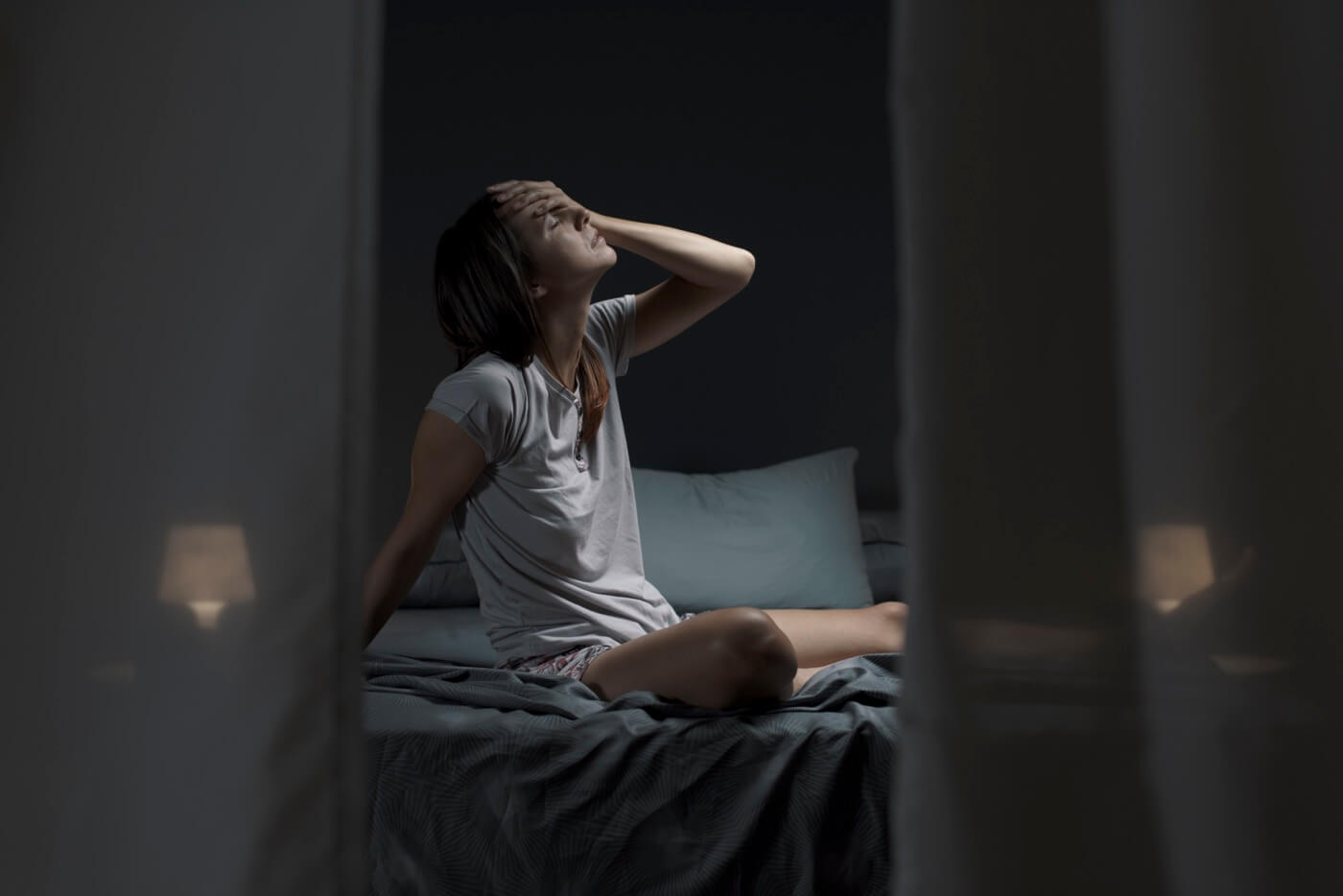Menopause is a natural occurrence that afflicts women in their 40s and 50s. For Canadian women, the average age of menopause is 51.5 years. Women experience perimenopause several years before menopause.
It is observed by having a 12-month lapse without a menstrual cycle and is often accompanied by many undesirable symptoms, including mood swings, night sweats, anxiety and depression, and sleep problems.
Menopause and sleep problems go hand-in-hand, and we’ve compiled the information below to help you understand why.

How and why does menopause affect sleep?
Through menopause, a woman begins producing fewer and fewer hormones, specifically estrogen and progesterone, leading to a slew of changes.
More than 50 percent of women aged 35 to 55 have trouble sleeping several nights each week because of menopause. But why?
Our body relies on estrogen to maintain our overall health. Without an adequate amount of estrogen being produced, women begin to experience an increase in anxiety and depression, resulting in an increased difficulty falling asleep or achieving restorative sleep.
Common sleep problems associated with menopause
As previously mentioned, menopause sleep problems cause many side effects for women, including the various sleep difficulties listed below:
Insomnia is difficulty falling asleep or staying asleep throughout the night. When it occurs for weeks or months, it’s chronic, and it can eventually have detrimental effects on your physical and mental health. Menopause insomnia leaves women feeling restless throughout the night and waking the next morning feeling exhausted.
Hot flashes are classified as an unexpected feeling of heat - most commonly starting in the face and working its way to the rest of the body. Hot flashes at night are commonly referred to as night sweats, and cause a great deal of discomfort for women. Most women find their hot flashes tend to the most intense during the initial two years of menopause, though, hot flashes and night flashes can linger throughout menopause. Perimenopause sweating at night is the result of a gradual decrease in the hormones responsible for temperature regulation.
Sleep disorders that affect breathing include snoring, sleep apnea, and obstructive sleep apnea. While these conditions can affect women at all stages of life, they are most common when women are postmenopausal. When a woman reaches perimenopause, the risk of obstructive sleep apnea involving brief pauses of breathing can increase as a result of a decrease in progesterone.
Menopause sleeplessness affects many aspects of a woman’s life, including their mental health. Mental health is something that can easily be altered, leaving women to experience common mood disorders including:
- Increased irritability
- Anxiety
- Depression
These conditions are often treated by a medical professional with therapy or antidepressant medications, such as SSRIs, SNRIs, and anti-anxiety prescription drugs.
Menopause and sleep disorders affect women differently. While some women experience minor changes in sleep habits, other women report experiencing less common sleep disorders, such as:
- Periodic limb movement disorder
- Restless leg syndrome
These two conditions are signaled by involuntary leg movements or spasms resulting in sleep disruptions and extreme discomfort.
Perimenopause and sweating at night
While menopause insomnia is common in women, perimenopause night sweats are often the first sign of a decrease in hormones.
Perimenopause is the transitional period occurring before menopause.
A woman may experience perimenopause for between 2 and 10 years before menopause occurs.

During this time, the natural production of hormones gradually decreases, which in turn significantly increases the risk of experiencing night sweats.
While issues are commonly reported between menopause and sleep disturbances, perimenopause causes many problems for women as well.

Can treating menopause improve sleep?
In short, yes, treating menopause can improve the quality of sleep a woman may experience. Menopause is an irreversible part of life for a woman. Therefore, treatment focuses on alleviating symptoms rather than treating the condition itself.
Medical professionals often implement hormone replacement therapy (HRT) or estrogen replacement therapy (ERT) to replace the hormones that have been lost within the body.
HRT and ERT have shown success in alleviating common symptoms associated with perimenopause, menopause, and postmenopause.
However, there is an increased risk of a blood clot, heart attack, and stroke.
Because of this, doctors often opt to start with low doses of hormones and use hormone replacement therapy as a short-term treatment.
Since menopause affects a person's mental health, the use of prescription medications under the direct supervision of a licensed physician is often used.
These conditions are treated through the use of antidepressants, anti-anxiety medications, SSRIs, SNRIs, and benzodiazepines. It is important that you follow the instructions carefully to achieve the best results with prescription medications.
As our body produces fewer and fewer hormones, we also produce less melatonin - the hormone that regulates and allows us to fall asleep. As a result, sleep aids or melatonin vitamins or gummies are often recommended to improve the ability to fall asleep and stay asleep.
Frequently asked questions
Menopause and sleep disorders, including menopause insomnia, can affect women experiencing perimenopause, menopause, or postmenopause. To help reduce the risk of insomnia, experts recommend:
- Maintaining a healthy weight
- Implement a healthy diet
- Exercise regularly
- Do not take in caffeine, nicotine, or alcohol
- Use a sleep aid
- Limit stress
Many women going through menopause do not experience an increase in the number of hours slept. Women experiencing menopause report sleeping less than their normal number of hours each night due to extreme discomfort, restless leg syndrome, night sweats, and other sleep problems. However, with the help of melatonin or other sleep aids, many women have reported ease of falling asleep and staying asleep.
Polysleep tips to sleep better with menopause
At Polysleep, we understand that perimenopause, menopause, and postmenopause are a part of life that a woman cannot avoid nor control, which is why we strive to provide comfort to those experiencing discomfort while trying to sleep.
Perhaps one of the most important parts of living with menopausal symptoms is choosing the right mattress.

Many mattresses have different qualities, such as shape, size, and features. The Zephyr Mattress from Polysleep is designed with comfort in mind.
Through the use of nanobionic technology, temperature-regulating properties, and antimicrobial foam, you are sure to experience the ultimate restorative sleep possible. The Zephyr Mattress comes with a 100-night free trial period, free shipping, and a 10-year warranty.
In addition, we know millions of women experience hot flashes and night sweats leaving them to wake up drenched, uncomfortable, and unable to fall back to sleep. The PolyCool is a ¼” cooling mattress topper that works by extracting heat from your body when you get too hot.
The heat extracted from your body is stored in the topper and released if/when you cool down or get cold again. We do not offer a trial period with the PolyCool, however, this mattress topper is an excellent option for those experiencing night sweats as it offers continual temperature regulating properties.

The experts at Polysleep also recommend:
- implementing a bedtime routine that you closely follow each night. This helps to trigger your body and mind to know that it’s time to wind down and get ready to fall asleep.
- Maintaining a healthy diet,
- Participating in regular exercise,
- And avoiding certain foods have also been proven to help reduce the symptoms associated with perimenopause, menopause, and postmenopause.
Conclusion
Menopause is an unavoidable part of a woman’s life, marking the end of the chance of conceiving a child and leaving women to experience a gradual decrease in hormones responsible for many vital functions.
Although menopause leaves women to experience uncomfortable side effects such as night sweats, mood disorders, and sleep disturbances, treatment can help.
Not only has treatment been proven effective, utilizing bedding with temperature-regulating properties will be sure to leave you cool and comfortable all night.
If you liked our blog article, please don't forget to
Share it with your friends by clicking the button below!











